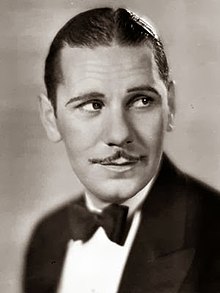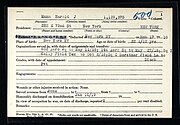Brooks Benedict
Brooks Benedict | |
|---|---|
 | |
| Born | Harold J. Mann February 6, 1896 New York City, U.S. |
| Died | January 1, 1968 (aged 71) Houston, Texas, U.S. |
| Resting place | Houston National Cemetery |
| Occupation | Actor |
| Years active | 1923–1958 |
Brooks Benedict (born Harold J. Mann, February 6, 1896 – January 1, 1968) was an American actor of the silent and sound film eras, when he played supporting and utility roles in over 300 films, mostly uncredited.[citation needed]
Life[]
He was born to Alice Julian and Samuel Mann.[1] He attended Princeton University for two years,[2] and was a member its football team.[3]
He then joined the American Ambulance Corp. in France for six months at the height of World War I.[4] Upon return and after the Selective Service Act of 1917, he enlisted and served as a private in the United States Army Air Service (632 Aero Sq., 144 Aero Sq., Sq. I Kelly Field, Sq. C Gerstner Field; Flying School Detachment).[5]
Benedict then went to Hollywood and pursued different jobs until his starting role in William Wellman's movie Cupid's Fireman (1923) at Fox Film Corporation. His first major role came later opposite Harold Lloyd in The Freshman / College Days (1925) as the Campus Cad.[3] He continued to appear with Lloyd and other prominent silent era stars in the 1920s During World War II and throughout the 1940s, he appeared in more than 130 movies, where he was limited to utility roles in all but three. During this time, in an interview published in the Prescott Evening Courier, he and Howard R. Philbrick (Chief Casting Executive) explain the challenges faced by some 7000 extras in 1940 Hollywood.[6] In later stages of his career, he extended his work to television, appearing as a regular in such series as the Four Star Playhouse (1956). His last performance was in the movie Houseboat (1958).
As of 1940, he was married to Marjorie Benedict (born 1911, New York) in Los Angeles.[2]
He died at 12:05 am January 1, 1968, in Bellaire General Hospital in Houston, Texas, due to myocardial infarction after a history of arteriosclerosis and rheumatic heart disease.[1]
Gallery[]

Harold J. Mann (Brooks Benedict) Army Registration Card 1917

Harold J. Mann Army Air Service # 1,139,375
Selected filmography[]
- Cupid's Fireman (1923) - Bill Evans
- The Only Woman (1924) - First Officer
- The Love Gamble (1925)
- The Freshman (1925)
- Why Girls Go Back Home (1926, lost)
- Tramp, Tramp, Tramp (1926)
- Ranson's Folly (1926)
- The Strong Man (1926) (uncredited)
- Orchids and Ermine (1927)
- The Drop Kick (1927)
- The Kid Sister (1927)
- Lost at the Front (1927)
- The Gorilla (1927)
- Speedy (1928)
- The Cowboy Kid (1928)
- Moran of the Marines (1928)
- Clear the Decks (1929)
- Street of Chance (1930)
- Recaptured Love (1930)
- The Office Wife (1930)
- Derelict (1930)
- The Widow from Chicago (1930)
- Gun Smoke (1931)
- Reckless Living (1931)
- Girl Crazy (1932)
- What Price Hollywood? (1932)
- Cheating Blondes (1933)
- No Other Woman (1933)
- Picture Brides (1934)
- Buried Loot (1935)
- Murder on a Honeymoon (1935)
- Follow the Fleet (1936)
- The Affairs of Annabel (1938)
- Rose of Washington Square (1939)[7]
- I Take This Oath / Police Rookie (1940)
- The Dancing Masters (1943)
- The Gang's All Here (1943)
- The Dolly Sisters (1945)
- Three on a Ticket (1947)
- Strangers on a Train (1951) - tennis umpire (uncredited)
References[]
- ^ Jump up to: a b Benedict, Brooks. "Texas, Death Certificate No. 03491". FamilySearch. Retrieved 19 September 2015.
- ^ Jump up to: a b Benedict, Brooks. "United States Census, 1940". FamilySearch. Retrieved 19 September 2015.
- ^ Jump up to: a b "Without a Kick". Daily Telegraph. Launceston, Tasmania. XLVI (252): 15. October 23, 1926.
- ^ Mann, Harold. "World War I Selective Service System Draft Registration Cards (1917–1918); United States, Selective Service System". M1509, 4, 582 rolls. Washington, D.C.: National Archives and Records Administration. Cite journal requires
|journal=(help) - ^ Mann, Harold (1917–1919). "Abstracts of World War I Military Service". New York State Archives. Albany, New York: New York State. Adjutant General's Office. (Series B0808).
- ^ "Few Film Extras Make a Living and Still Fewer Become Stars". Prescott Evening Courier (Arizona). Western Newspapers. LVIII (160): 9. July 5, 1940.
- ^ Great Movie Musicals on DVD - A Classic Movie Fan's Guide by John Howard Reid - Google search with book preview
External links[]
- 1968 deaths
- American male film actors
- American male silent film actors
- 1896 births
- 20th-century American male actors
- Silent film comedians
- Princeton Tigers football players
- 20th-century American comedians
- American male comedy actors

